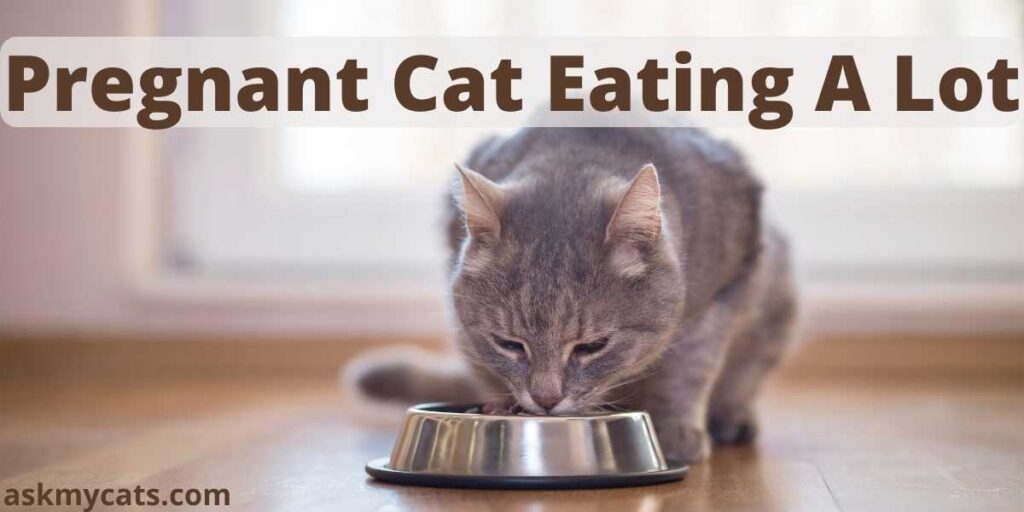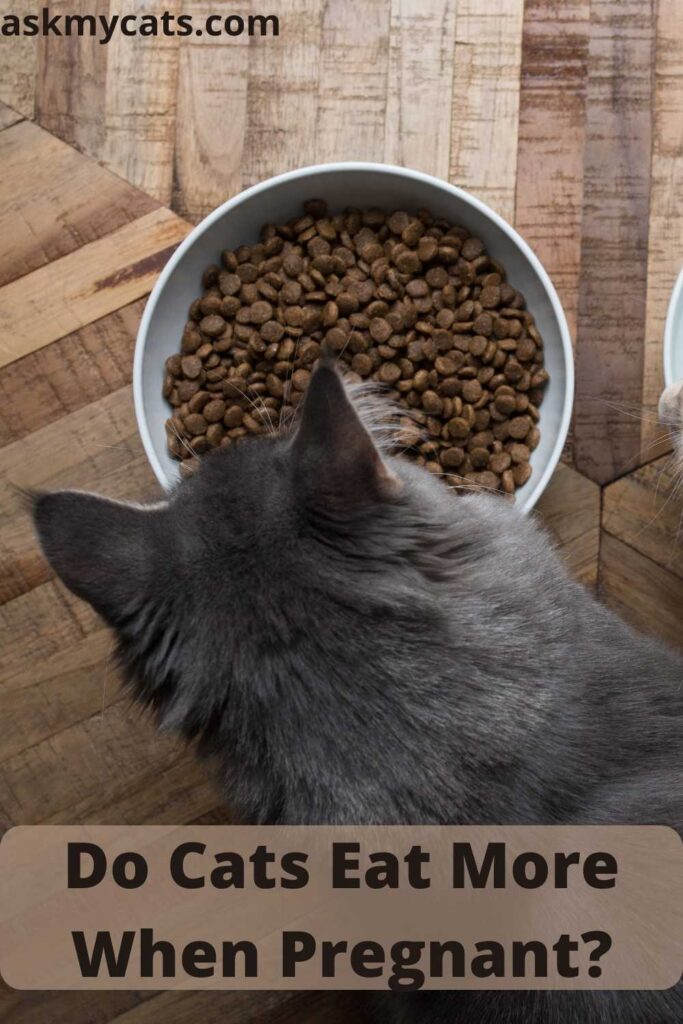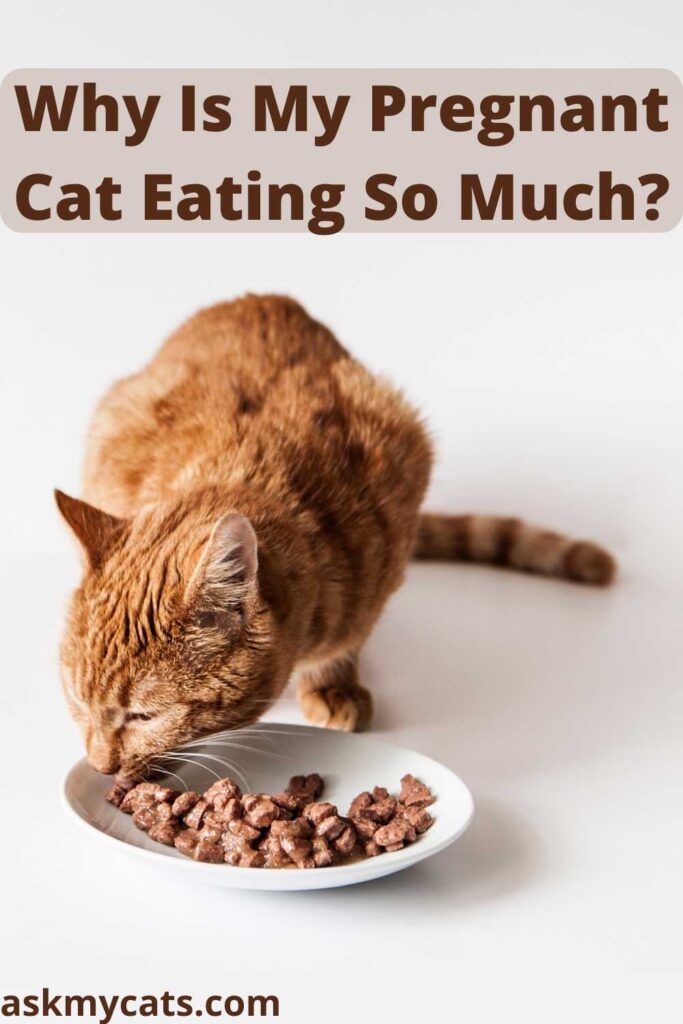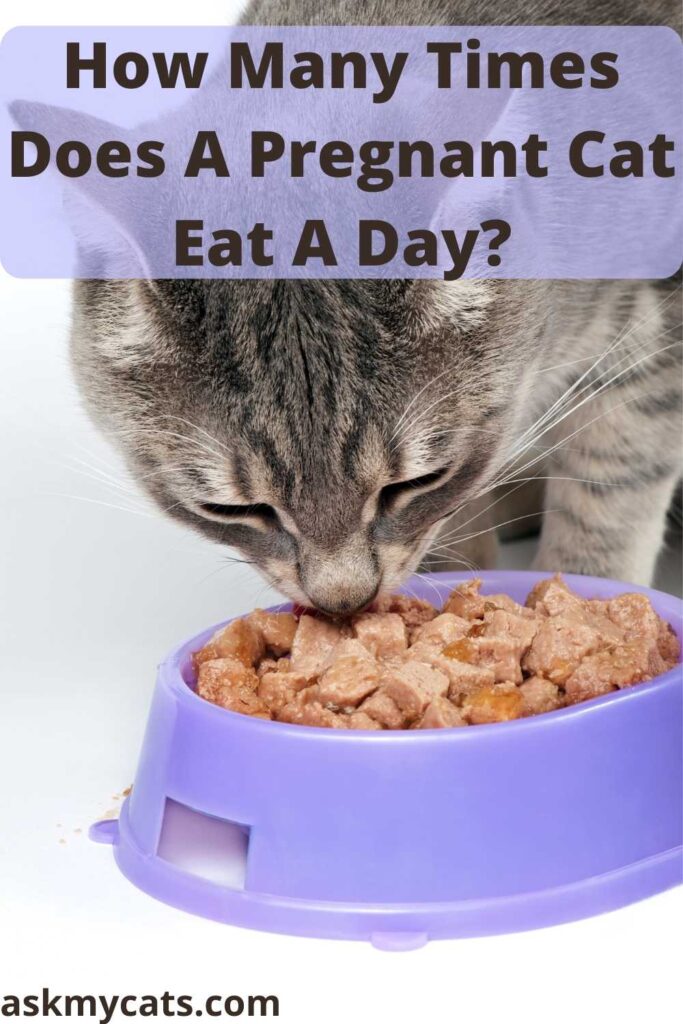Both you and your cat will experience great exhaustion during pregnancy. It’s crucial that you assist the future mother by giving her the nutrition she requires.
Choosing the proper diet during pregnancy ensures the kittens’ proper development and gives the mother the energy she needs to cope with labor and nursing.
So, do pregnant cat eats a lot?
Yes, pregnant cats do eat a lot as they need more energy in order to meet their and their kittens’ nutritional needs.
Keep reading this article to know more about why your pregnant cat is eating a lot.


Give Your Cat the Perfect Day
Get the Free Ebook!
Do Cats Eat More When Pregnant?
Yes, cats do eat more when pregnant.

From the moment your pregnant cat mates all the way through the end of her pregnancy, her food consumption will gradually increase.
She will consume approximately 50% more food than she normally would by the end of her term, though it is not uncommon for her to require up to twice her normal intake!
Fortunately, it’s not too difficult to feed pregnant cats.
They typically act sensibly, eating only what they need and stopping when they’ve had enough as long as you give them enough food.
Start feeding your pregnant cat kitten formula in the fourth week of her pregnancy because kittens require extra nutrition during their early development.
When choosing what kitten food to give your pregnant cat, keep in mind her preferences. If she typically prefers wet food, keep in mind that it has fewer calories than dry food.
To give her the extra energy she’ll need, try combining the two.
Always make sure she has access to plenty of fresh water so she can stay hydrated, especially if she favors a diet high in dry foods.
Introduce your cat’s new diet gradually to ensure a smooth transition for her stomach.
Spend 7–10 days gradually introducing the new formula to her regular food before switching them over entirely.
This method of feeding should make the transition for pregnant cats as easy as possible.
Why Is My Pregnant Cat Eating So Much?
Here are some reasons behind your pregnant cat eating so much: –

1. Increased Nutritional Needs
This is the primary reason behind your pregnant cat eating so much.
Similar to human women, female cats go through a variety of changes during pregnancy.
Major increases in appetite are common during certain stages of gestation.
A queen cat’s appetite may fluctuate while she is nursing her adorable kittens, ups, and downs.
In most cases during a cat pregnancy, the mother-to-be is more gluttonous than usual.
She might beg for a second helping much more frequently than she normally would.
Even though your cat might not exactly eat everything she sees, it’s possible that she will consume food that she would ordinarily reject, such as store-brand dry food.
Keep in mind that a pregnant cat will be feeding two, three, four, five, or more fetuses at once.
Give the mother a number of smaller meals throughout the day to keep her energy levels up.
If at all possible, try to keep food and water readily available at all times, leaving dry food out for her to graze on.
From week 9 of her pregnancy onward, her kittens will really start to develop, so she should gradually increase her food intake until she has nursed her litter.
As your cat starts eating more, you might notice an increase in her weight. A portion of this will be the fat she is storing to aid in feeding her kittens while they are nursing.
This weight gain is entirely normal, and she should shed the extra pounds during the three to four weeks she will be nursing.
Interesting Read: Why Is My Nursing Cat Always Hungry?
Cats that are pregnant require special nutrition during their pregnancy as well as additional care.
Cats can become pregnant for 58 to 70 days, though the average gestation period is 63 to 65 days.
A healthy, well-nourished queen will gain weight steadily over the course of the three trimesters of pregnancy.
This weight gain seems to serve as a form of energy reserve for upcoming lactation.
At the end of the pregnancy, obesity brought on by overeating increases the likelihood of difficult or protracted labor and adds stress to the kittens.
On the other hand, inadequate prenatal nutrition can lead to embryo loss, abnormal fetal development, spontaneous abortion or stillbirth, a small litter size, and kittens with low birth weights who do not thrive.
The queen must maintain her current weight and physical condition, so keep an eye on them and give her more food as needed.
During a feline’s pregnancy, a highly digestible, premium kitten/growth/development formulation is typically advised.
The diets that have succeeded in feeding tests for gestation/lactation or for all life stages are the best choices.
Multiple small meals may aid the queen in maintaining an adequate calorie and nutrient intake, particularly in the third trimester.
Before breeding and becoming pregnant, switching to kitten food might be a good idea to reduce any unnecessary stress related to this change.
It’s your responsibility to make sure your cat eats as nutrient-densely as possible while she is expecting.
Never, ever let her eat whatever she sees because that is unhealthful. Pregnant cats understandably need a lot of energy, just like young kittens do.
It’s crucial to give your cat a diet high in protein due to the increased demand for energy.
Choose kitten-specific food because it will properly nourish both the expectant mother and her upcoming litter of adorable fluffy balls.
2. They Could Be Bored, Lonely, Or Depressed
Your pregnant cat may be eating excessively for a valid reason if they are. Some felines eat more when they’re upset or bored.
It’s not just humans who use comfort food as a coping mechanism. Overeating can also be sparked by boredom, depression, and anxiety.
If you think any of these problems may be the main reason for your pregnant cat’s eating difficulties, consult a veterinarian.
They might advise giving your pregnant cat more affection and stimulation to curb its appetite.
3. Their Food Isn’t Meeting Their Nutritional Needs
If their food does not contain enough nutrients, pregnant cats may also overheat.
Low-quality kibble will make your pregnant cat feel unfulfilled and make them hungry again soon after their meal.
Their age could also be a factor. Cats lose their ability to digest proteins and fats as they age. They also require more energy at the same time.
Your senior pregnant cat may start eating more in order to get the calories its body requires.
4. Medical Condition
Additionally, certain illnesses may cause your pregnant cat to eat more than usual. Such conditions include hyperthyroidism and diabetes.
If you’ve ever wondered why your pregnant cat loses weight despite eating excessively, it might be suffering from one of these conditions.
Your pregnant cat’s body can’t efficiently convert sugar to energy due to diabetes, and hyperthyroidism makes its metabolism burn through too many calories.
To make up for the lack of nutrients, your pregnant cat may start overeating.
Additionally, parasites and gastrointestinal issues can make your pregnant cat more hungry.
Your pregnant cat’s capacity to process nutrients is reduced by conditions that affect the small intestine, such as intestinal cancer or inflammatory diseases.
As a result, there is an increase in appetite and weight loss.
Your pregnant cat may experience constant hunger if they have roundworms because the parasite steals all of its nutrients before its body can use them.
Your pregnant cat may become constantly ravenous due to pancreatic disease.
Exocrine pancreatic insufficiency (EPI), a condition where the pancreas is unable to function, prevents the pancreas from producing the enzymes necessary for digestion.
This could result in your pregnant cat eating more, throwing up, having diarrhea, and losing weight shake your pregnant cat to the vet if you think she may have a medical issue so they can receive a proper diagnosis and treatment strategy.
How Many Times Does A Pregnant Cat Eat A Day?
A pregnant cat could eat four to six meals a day.

You should feed your pregnant cat a premium food that is designed for growth.
To ensure that a meal is adequate for growth and reproduction, look for the AAFCO Nutritional Adequacy statement.
Frequently, this is some kind of kitten food. Generally speaking, wet food is healthier than dry food, but either would be acceptable.
It is always best to ask your veterinarian for their recommendations before making food choices.
Avoid overfeeding your pregnant cat in the first few weeks of pregnancy.
She does require ample good nutrition for both herself and her kittens.
The kitten food, on the other hand, has the extra calories and nutrients she requires. She and the kittens could have issues if she puts on weight.
After you’ve confirmed that she’s pregnant, gradually switch over to kitten food; however, unless she’s underweight or acting hungry, don’t up her feeding.
With your veterinarian’s assistance, keep an eye on her physical condition throughout her pregnancy.
You should start feeding your pregnant cat more frequently spaced-out small meals once she is about six weeks along.
She struggles to eat much at once because of the kittens’ weight on her stomach, but she still needs the extra food. Four to six times a day, give her small meals.
Also, check out: Do Pregnant Cats Sleep A Lot?
Can You Overfeed A Pregnant Cat?
No, you should not overfeed a pregnant cat as this could lead to obesity and increases the likelihood of difficult or protracted labor, and adds stress to the kittens.
If you always give your pregnant cat access to food, you might not pay attention to how much it consumes.
Sadly, cat obesity is on the rise and can lead to additional health issues. Change the quantity or type of food your pregnant cat eats each day to prevent overfeeding.
Make sure your cat is still receiving the nutrients it needs by working with your veterinarian.
Simple adjustments can also be made to the way your pregnant cat is fed. This may cause your pregnant cat to eat more slowly or require more effort.
Healthy eating creates the conditions for successful conception and reproduction.
Both an overweight and an underweight queen will experience reproductive problems, as will her kittens.
The most prevalent nutrition-related issue among reproducing queens is obesity. Obesity can lead to smaller litter sizes by reducing the number of eggs released during ovulation.
Additionally, obesity can have a negative effect on the health and growth of kittens during lactation by reducing milk production.
Prior to breeding, an obese or overweight queen should lose weight. A queen does not have any particular dietary needs while she is in heat.
Interesting Read: Why Is My Pregnant Cat Purring So Much?
Frequently Asked Questions
Why are increased energy and fat so important in pregnant cats?
Pregnant and lactating cats require a lot of energy, thus more energy and fat are vital. The most energy-intensive period of a cat’s life is nursing.
Nursing cats require 2 to 6 times the amount of energy that a healthy adult cat does. The amount of food eaten that is actually absorbed by the cat’s body is referred to as digestibility.
Because energy requirements are high and there is less physical space in the tummy of pregnant cats, excellent digestibility is critical.
What are the consequences of overfeeding a cat?
If cats are routinely overfed, they will gain weight. As a result, they become less active, drowsy, and mobile and may eventually become ill. Obese cats may develop diabetes, liver, or heart disease.
Overfeeding can be easily avoided. Regular, prolonged overeating can be fatal. An overweight diabetic cat won’t live as long as it should if its condition is not properly managed.
The lifespan of a cat can also be shortened by liver disease, pancreatitis, and other medical conditions.
How to monitor kittens’ health?
Keep an eye on the kittens’ weight. I cannot emphasize enough the need of weighing your kittens at least twice a day. If they are being cared for by a mama cat.
It’s crucial to keep track of their weight so you can make sure they’re getting enough food and staying healthy.
You should be prepared to step in with additional feeding if a kitten’s weight is stagnant or decreasing.
Final Words
There is usually no need to worry if you notice that your pregnant cat is eating a lot, as it is totally normal as her nutritional needs increase. Just be sure not to overfeed and consult your vet frequently.
If you have any questions, ask us in the comments section.
Interesting Read: Why Is My Pregnant Cat Meowing So Much?
